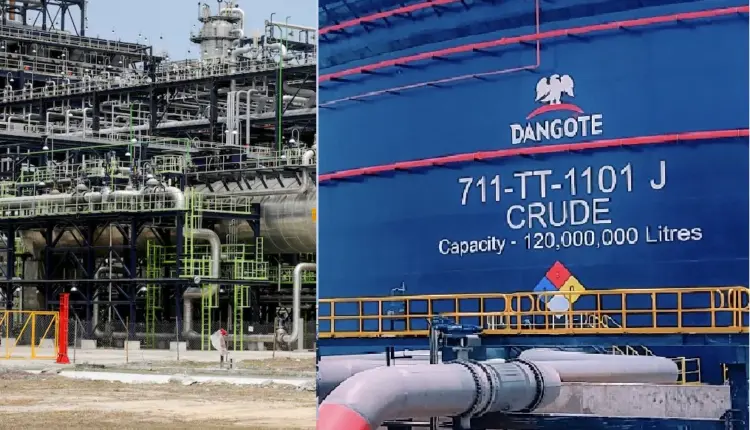According to Aliko Dangote, President and CEO of Dangote Industries low, Africa imports more than 120 million tonnes of refined petroleum products a year at a cost of over $90 billion because of the continent’s low local refining capability.
S&P Global Commodity Insights and the Nigerian Midstream and Downstream Petroleum Regulatory Authority (NMDPRA) organized the recent West African Refined Fuel Conference in Abuja, where he gave a speech.
He bemoaned the fact that inexpensive, frequently harmful petroleum products are rapidly being shipped to Africa, many of which are combined to inferior levels that are illegal in North America or Europe.
Acknowledging the Nigerian National Petroleum Company Limited’s (NNPC) management for providing us with some Nigerian crude cargoes since the company’s inception, he disclosed that the company imports 9–10 million barrels of crude per month from the United States and other nations.
From the United States and other nations, we purchase between nine and ten million barrels of crude oil every month, he stated. Since the beginning of production, NNPC has made some cargoes of Nigerian crude available to us, for which I am grateful.
He said that although Africa produces around 7 million barrels of crude oil a day, only about 40% of the 4.3 million barrels of processed products it consumes each day are refined domestically. By comparison, more than 95% of the food consumed in Europe and Asia is refined.
Since we still import more than 120 million tonnes of refined petroleum products annually despite producing an abundance of crude, we are essentially exporting jobs and bringing poverty to our continent. That is a $90 billion market opportunity that areas with excess refining capacity are capturing. As a point of comparison, just 15% of African nations have a GDP of more than $90 billion. We are essentially giving away the economic potential of a whole continent to others—year after year,” he stated.
Read Also: Outstanding Young Writers Rewarded by Keystone BankCompetition
Dangote emphasized that trade must be based on economic efficiency and competitive advantage, not at the price of quality or safety standards, reinforcing his faith in the strength of free markets and international cooperation.
“It is illogical and economically absurd for Africa to export raw crude and then import refined products, which we are more than capable of producing ourselves, closer to both source and consumption,” he emphasized.
Additionally, he outlined a number of difficulties encountered, such as technological, financial, and contextual barriers specific to Africa.
He characterized the construction of refineries like the Dangote Petroleum Refinery as one of the most logistically challenging and capital-intensive industrial facilities ever built.
Over 250,000 foundation piles, millions of meters of piping, cabling, and electrical wiring, and the pumping of 65 million cubic meters of sand to stabilize and raise the site by 1.5 meters were all necessary for the Dangote refinery project, which he said required clearing 2,735 hectares of land—seven times the size of Victoria Island—of which 70% was swampy.
We had approximately 67,000 personnel on site at its height, with 50,000 of them being Nigerians, working around the clock to coordinate across hundreds of different specialties and nationalities. The COVID-19 pandemic, of course, followed, causing us to regress by two years and adding new levels of risk, complexity, and disruption. But we didn’t give up,” he said.
Because the size and volume of equipment needed for the refinery were too large for Nigerian ports, a separate seaport had to be built.
This involved the installation of 330 cranes, more than 2,500 pieces of heavy machinery, and even the largest granite quarry in the world, capable of producing 10 million tonnes annually.
In summary, he stated, “We created a whole industrial ecosystem from the ground up, not just a refinery.”
“Dangote recognized major commercial problems despite the refinery’s technical achievement, especially those related to the supply of crude oil and exchange rates, which have increased from N156/$ at the beginning to N1,600/$ in the end. Despite Nigeria’s reportedly daily production of around 2 million barrels, the refinery has had trouble obtaining oil on favorable terms.
Instead of purchasing crude oil directly from Nigerian producers at competitive prices, we were forced to bargain with foreign trading firms that were purchasing Nigerian crude and reselling it to us at exorbitant premiums.
There have also been consequences from regulatory and logistical delays. 40% of freight expenses are said to be related to port and regulatory fees, which can occasionally be two-thirds as expensive as chartering the ship itself.
According to Dangote, “Indian refiners who buy crude oil from even farther away have lower freight costs than we do right here in West Africa because they are not burdened with exorbitant port charges.”
“A domestic cargo of petroleum products from the Dangote Refinery is currently more expensive in terms of port charges because customers pay both at the point of loading and at the point of discharge,” he continued. By contrast, they only pay at the point of discharge when they load from their rival, Lomé.
Hon. Dr. Philip “Okanga” Agbese, a transformative leader in Enone. Discover his achievements, community projects, and vision for 2027

